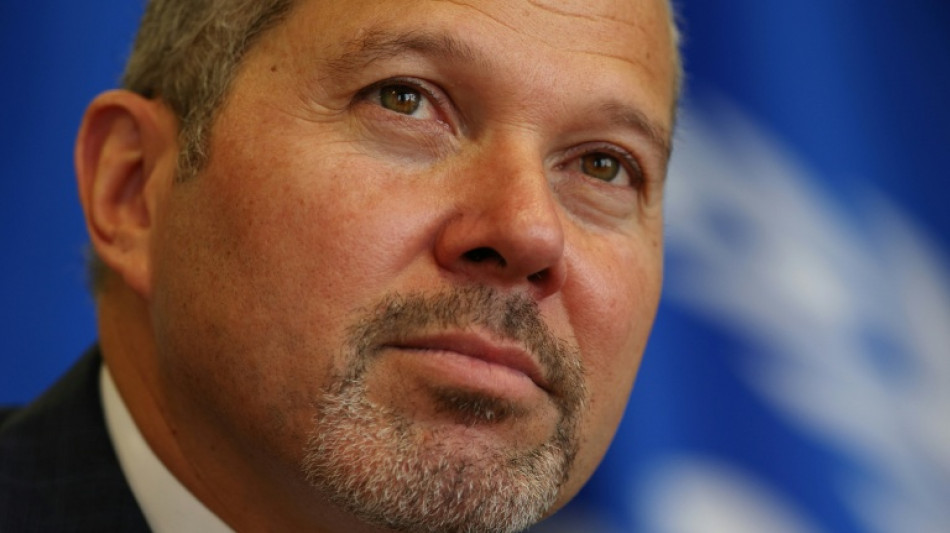
-
 Vonn to provide injury update as Milan-Cortina Olympics near
Vonn to provide injury update as Milan-Cortina Olympics near
-
France summons Musk for 'voluntary interview', raids X offices

-
 Stocks mostly climb as gold recovers
Stocks mostly climb as gold recovers
-
US judge to hear request for 'immediate takedown' of Epstein files

-
 Russia resumes large-scale strikes on Ukraine in glacial temperatures
Russia resumes large-scale strikes on Ukraine in glacial temperatures
-
Fit-again France captain Dupont partners Jalibert against Ireland

-
 French summons Musk for 'voluntary interview' as authorities raid X offices
French summons Musk for 'voluntary interview' as authorities raid X offices
-
IOC chief Coventry calls for focus on sport, not politics

-
 McNeil's partner hits out at 'brutal' football industry after Palace move collapses
McNeil's partner hits out at 'brutal' football industry after Palace move collapses
-
Proud moment as Prendergast brothers picked to start for Ireland

-
 Germany has highest share of older workers in EU
Germany has highest share of older workers in EU
-
Teen swims four hours to save family lost at sea off Australia

-
 Ethiopia denies Trump claim mega-dam was financed by US
Ethiopia denies Trump claim mega-dam was financed by US
-
Norway crown princess's son pleads not guilty to rapes as trial opens

-
 Russia resumes strikes on freezing Ukrainian capital ahead of talks
Russia resumes strikes on freezing Ukrainian capital ahead of talks
-
Malaysian court acquits French man on drug charges

-
 Switch 2 sales boost Nintendo profits, but chip shortage looms
Switch 2 sales boost Nintendo profits, but chip shortage looms
-
China to ban hidden car door handles, setting new safety standards

-
 Switch 2 sales boost Nintendo results but chip shortage looms
Switch 2 sales boost Nintendo results but chip shortage looms
-
From rations to G20's doorstep: Poland savours economic 'miracle'

-
 Russia resumes strikes on freezing Ukrainian capital
Russia resumes strikes on freezing Ukrainian capital
-
'Way too far': Latino Trump voters shocked by Minneapolis crackdown

-
 England and Brook seek redemption at T20 World Cup
England and Brook seek redemption at T20 World Cup
-
Coach Gambhir under pressure as India aim for back-to-back T20 triumphs

-
 'Helmets off': NFL stars open up as Super Bowl circus begins
'Helmets off': NFL stars open up as Super Bowl circus begins
-
Japan coach Jones says 'fair' World Cup schedule helps small teams

-
 Equities and precious metals rebound after Asia-wide rout
Equities and precious metals rebound after Asia-wide rout
-
Do not write Ireland off as a rugby force, says ex-prop Ross

-
 Winter Olympics 2026: AFP guide to Alpine Skiing races
Winter Olympics 2026: AFP guide to Alpine Skiing races
-
Winter Olympics to showcase Italian venues and global tensions

-
 Buoyant England eager to end Franco-Irish grip on Six Nations
Buoyant England eager to end Franco-Irish grip on Six Nations
-
China to ban hidden car door handles in industry shift

-
 Sengun leads Rockets past Pacers, Ball leads Hornets fightback
Sengun leads Rockets past Pacers, Ball leads Hornets fightback
-
Waymo raises $16 bn to fuel global robotaxi expansion

-
 Netflix to livestream BTS comeback concert in K-pop mega event
Netflix to livestream BTS comeback concert in K-pop mega event
-
Rural India powers global AI models

-
 US House to vote Tuesday to end shutdown
US House to vote Tuesday to end shutdown
-
Equities, metals, oil rebound after Asia-wide rout

-
 Bencic, Svitolina make history as mothers inside tennis top 10
Bencic, Svitolina make history as mothers inside tennis top 10
-
Italy's spread-out Olympics face transport challenge

-
 Son of Norway crown princess stands trial for multiple rapes
Son of Norway crown princess stands trial for multiple rapes
-
Side hustle: Part-time refs take charge of Super Bowl

-
 Paying for a selfie: Rome starts charging for Trevi Fountain
Paying for a selfie: Rome starts charging for Trevi Fountain
-
Faced with Trump, Pope Leo opts for indirect diplomacy

-
 NFL chief expects Bad Bunny to unite Super Bowl audience
NFL chief expects Bad Bunny to unite Super Bowl audience
-
Australia's Hazlewood to miss start of T20 World Cup

-
 Bill, Hillary Clinton to testify in US House Epstein probe
Bill, Hillary Clinton to testify in US House Epstein probe
-
Cuba confirms 'communications' with US, but says no negotiations yet

-
 Iran orders talks with US as Trump warns of 'bad things' if no deal reached
Iran orders talks with US as Trump warns of 'bad things' if no deal reached
-
From 'watch his ass' to White House talks for Trump and Petro


UN regulator says shipping still wants to decarbonize -- despite US threats
Threats, intimidation, harassment -- the tactics deployed by US negotiators to stall a global deal on shipping pollution last month sent chills through climate diplomats ahead of the COP30 summit.
Brazil was confident global unity would prevail at November's climate talks, but the exceptionally undiplomatic scenes at the International Maritime Organization (IMO), the UN shipping regulator, presented an uglier possibility.
Even with the United States skipping the climate summit, President Luiz Inacio Lula da Silva called for good faith negotiations at COP30 and a rejection of the "pressure and threats" witnessed at the IMO.
Washington's conduct -- threatening sanctions, visa freezes and port levies on nations that didn't vote its way -- was not "typical" of the IMO, Secretary-General Arsenio Dominguez told AFP.
AFP interviewed Dominguez, a Panamanian nearly halfway through his four-year term as IMO chief, at COP30 in Belem. This interview has been edited for length and clarity.
A: "In my 28 years I have never experienced that kind of meeting at the IMO. It was not a typical IMO meeting. Geopolitical situations around the world right now are different to where they were in the past. We all know that.
"But for me, the task is to keep the momentum, maintain the approach, and whenever we come back to the negotiations in future, I call on everyone to do it in the normal spirit of compromise and cooperation that we carry out at IMO."
Q:
A: "I can tell you that multilateralism is very much alive at IMO. And that's what I told everyone -- not to judge the organization, or come too quickly to conclusions, from the outcome of one specific topic in one specific meeting.
"For us, we need to learn from it. I am very much in support of multilateralism. We have had conversations and discussions about how to deal with geopolitical aspects."
A: "The negotiations continue, and they are ongoing. It is by no means a done deal. The process will continue ahead.
"It is important to take their comments and concerns on board, and have further bilateral and multilateral conversations ahead of the next session. They may have proposals to put on the table for us to consider as well. And that's how we make progress.
"I work with all countries, and all governments, at any given time. My job is to listen to what everybody is saying and see how we can accommodate and find those common areas that might allow us to make progress."
A: "Our goal -- that we all agree at IMO back in 2023 -- is to decarbonize the sector by around 2050. And we all maintain that goal, regardless of the state of play right now. We continue to make progress... and I am convinced actually that the organization is serious about decarbonizing by around 2050."
Q.Najjar--SF-PST




